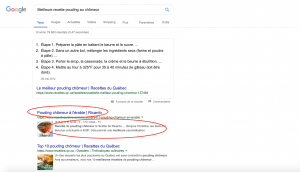Creating websites is all well and good, but they need to be visited, and for that to happen, they must be easily discoverable. One of the many ways to let Google know you exist is by integrating metadata into your website.
what are metadata?
Metadata is one of the tools for search engine optimization. In summary, they allow your site to communicate and be indexed. So when you search for “Best Poor Man’s Pudding recipe,” the metadata for the Poor Man’s Pudding recipe page on Ricardo’s website will talk to Google and seduce it into placing the page in the top search results. In practical terms, metadata consists of tags that describe the pages of your website and serve as summaries for search engines and users. If they accurately represent the content of your website, it’s a bonus in terms of search and results. If they don’t reflect the content of the associated page at all, it negatively affects search rankings and people are less likely to trust your site.
You’ll understand that when we create or redesign a website, writing metadata is a very important part of the process as it directly impacts the site’s search engine optimization.
Differents types of metadata
They go by several names: “meta tags,” “meta elements,” and more. In short, these are all words that are part of the HTML code that makes up the pages of your website when it’s online. There are different types of metadata (keywords, file names), but the two most important ones are the title and description. Why? First, because these are the pieces of information that the user reads on their search results page when performing a search. They greatly affect whether or not the user clicks on your link. The title and description are also Google’s favorites for the simple reason that they provide excellent clues about the content that makes up the website.

the title metadata
This is what’s written in your browser’s tab. It’s best if it’s short enough to be read in full and accurately represents the content of the page it describes. Often, it’s the page title along with the site’s name. For example, on the traditional pouding chômeur recipe page, the title would be: “Traditional Pouding Chômeur | Ricardo.”
metadata for description
In the eyes of Google, the description primarily serves to compare metadata with the content of the page and confirm their similarities. Hence the importance of writing important phrases or keywords that appear in the page’s text in order to place the most important words at the beginning of the description.
how to write descriptions effectively?
When search engine robots analyze metadata, they directly assess their quality. It’s important to write precise and relevant metadata. Here are some points to consider when it’s time to write metadata.
- The chosen words must repeat those present on the page or at least be part of the main lexical field. It should be a reminder of the characteristic elements of your content.
- Keep it concise. It’s not the time to write a novel; we aim for two or three simple and precise sentences, totaling approximately 150-170 characters.
- Each page should have a different and unique title.
- Avoid generic and superfluous words like “very good,” “for all,” etc. Remember that users read the description before clicking on the link, and they want to be convinced that it’s the right site to find what they’re looking for.
Let’s keep in mind that writing metadata is a form of seduction, and if you want to go for a drink with Google, you need to increase your chances. Imagine that your date doesn’t speak your language, so he/she will rely on the few words he/she knows to interpret what you’re saying. This is what metadata and search engines do as well!
In the end, we can agree that writing metadata is rarely the most enjoyable part of working on a website. It’s a behind-the-scenes task that can be quite repetitive, but take the time to do it well, and I guarantee it will pay off!


